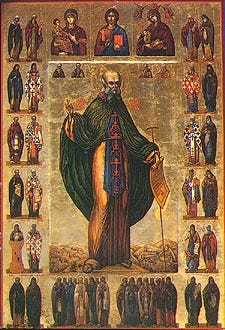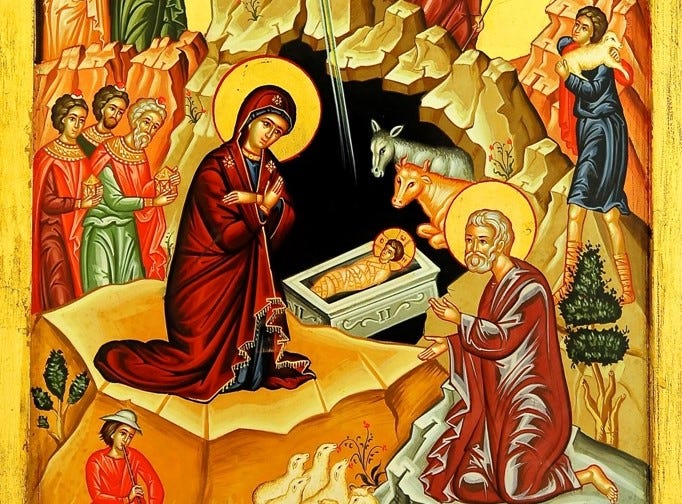“Wherever God is — there is peace. And the opposite is self-evident: where there is envy, enmity, impatience, self-love — there is the devil. Wherever the devil is — there, everything is ruinous, proud and hostile.”
+ St. Anatoly of Optina
Daily Scripture Readings
Wisdom of Solomon 3:1-9 (Vespers, 1st reading)
1 But the souls of the righteous are in the hand of God, and no torment will ever touch them.
2 In the eyes of the foolish they seemed to have died, and their departure was thought to be affliction,
3 and their going from us to be their destruction; but they are at peace.
4 For though in the sight of men they were punished, their hope is full of immortality.
5 Having been disciplined a little, they will receive great good, because God tested them and found them worthy of himself;
6 like gold in the furnace he tried them, and like a sacrificial burnt offering he accepted them.
7 In the time of their visitation they will shine forth, and will run like sparks through the stubble.
8 They will govern nations and rule over peoples, and the Lord will reign over them for ever.
9 Those who trust in him will understand truth, and the faithful will abide with him in love, because grace and mercy are upon his elect, and he watches over his holy ones.
Luke 21:28-33 (Gospel)
28 Now when these things begin to happen, look up and lift up your heads, because your redemption draws near.”
29 Then He spoke to them a parable: “Look at the fig tree, and all the trees.
30 When they are already budding, you see and know for yourselves that summer is now near.
31 So you also, when you see these things happening, know that the kingdom of God is near.
32 Assuredly, I say to you, this generation will by no means pass away till all things take place.
33 Heaven and earth will pass away, but My words will by no means pass away.
Ven. Savva the Sanctified (532)
Saint Savva the Sanctified was born in the fifth century at Cappadocia of pious Christian parents, John and Sophia, and his father was a military commander. Journeying to Alexandria on military matters, John and Sophia left their five-year-old son Savva in the care of an uncle. When the boy was eight years old, he entered the nearby Monastery of Saint Flavian. The gifted child quickly learned to read and became an expert on the Holy Scriptures. His parents urged Saint Savva to return to the world and enter into marriage, but all in vain.
When he was seventeen years old he was tonsured as a monk, and attained such perfection in fasting and prayer that God found him worthy of the gift of working miracles. After spending ten years at the Monastery of Saint Flavian, he went to Jerusalem, and from there to the Monastery of Saint Euthymios the Great (January 20). Saint Euthymios, however, sent the young man to Abba Theoktistos, the head of a nearby monastery with a strict cenobitic Rule. Saint Savva lived in obedience at this monastery until the age of thirty.
After the death of Elder Theoktistos, his successor blessed Savva to seclude himself in a cave. But on Saturdays, he left his hermitage and came to the Monastery, where he took part in the Divine Services and ate with the brethren. After a certain time, Saint Savva received permission not to leave his hermitage at all, and he struggled in the cave for five years.
Saint Euthymios directed the young monk's life, and seeing his spiritual maturity, he began to take him to the Rouba wilderness with him. They left on January 14, and remained there until Palm Sunday. Saint Euthymios called Saint Savva a Child-Elder, and encouraged him to grow in the monastic virtues.
When Saint Euthymios fell asleep in the Lord (+ 473), Saint Savva withdrew from the Lavra and moved to a cave near the monastery of Saint Gerasimos of Jordan (March 4). After several years, disciples began to gather around Saint Savva. As the number of monks increased, a Lavra sprang up. Guided by a pillar of fire which appeared before him as he was walking, Saint Savva found a spacious cave in the form of a church.
The holy Elder founded several more monasteries. Many miracles took place through his prayers: at the Lavra, a spring of water welled up, during a time of drought there was abundant rain, and the sick and those possessed by demons were also healed. Saint Savva composed the first monastic Rule of Church Services, the “Jerusalem Typikon," followed by all the Palestinian monasteries. The Saint surrendered his soul to God in the year 532.
Saint Savva is depicted holding a scroll which reads: "He who loves God disdains corruptible things, and prefers the knowledge of Him."
The Significance of Christ’s Nativity for Us
By Ioannis Karavidopoulos, Professor Emeritus of New Testament Hermeneutics
The Gospel reading for the Sunday before Christmas is taken from the beginning of Saint Matthew’s Gospel. It describes first the genealogy of Christ according to the flesh and then God’s dispensation regarding His birth from the Holy Spirit and the Virgin Mary. Let’s turn our attention to the significance of this event for each one of us.
Every year, in an atmosphere of joy and exultation, the Church celebrates the Birth of Christ and sings beautiful hymns to the incarnate God Who remakes our corrupted human nature. Orthodox hymnography and theology acclaim the enormous importance of the divine incarnation for humankind: from hopeless decay and the chaos of destructive hatred, we are saved by the love of God, Who took flesh and bone, within history, through the person of Jesus Christ. He not only redeems us from certain destruction, but also brings us back to our ‘ancient beauty’, ‘deifies’ us, in the language of the Fathers.
That which we could never have achieved because of our subjection to the demonic power of corruption and sin is given to us by Him Who is born of the Holy Spirit and the Virgin Mary. It is precisely the Savior’s provenance from the Holy Spirit that eloquently demonstrates that salvation could never have been achieved from the rubble and debris of humanity which had inevitably been condemned to death. It could come only from heaven, from the Spirit of God, from the source of life.
We speak of the significant transformation which the Birth of Christ means for us as if it were an objective circumstance which is related to us, certainly, but somehow independent of us. We forget that each of us has to relate immediately, dynamically and existentially to the important event of the Nativity. We accept that this personal omission on the part of each of us is due to the tragic contradiction between the fact that, although Christ was born in order to save us from the corruption of sin and death, we, however, degenerate, we’re destroyed, and destroy others on a daily basis. Even as the angels sing the glad tidings that ‘the Savior has been born’ and ‘peace on earth’ has come (Luke 2, 11;14), the media and sources of information are bearing wretched news about wars and catastrophes.
Christ’s Birth acquires meaning as an existential event for each of us in our singularity and uniqueness, in our personal problems and worries, in our fear of extermination and our hope for life. If the Sun of Righteousness doesn’t rise in the soul of each of us, it’s pointless to expect the enlightenment of humankind as a whole. If salvation isn’t a personal concern, it’s no use wondering and complaining about the general prevalence of hatred, crime and war. If the Nativity of Christ is no more than an important but distant historical event, or a moving feast of the Church and isn’t accomplished in each one of us, we await its manifest results in vain.
The God of love and peace takes on flesh within history, effectively dividing it with a bright boundary line between pre-Christian darkness and Christian light; pre-Christian hatred and Christian love; the pre-Christian atmosphere of the ‘odor of death’ and the Christian hope of the resurrection. If our life today bears the hallmarks of the pre-Christian era, as described above, we don’t have to look outside ourselves to find the reason. Christ’s Birth doesn’t, in and of itself, mean the triumph of love and peace. It’s the starting point for a dialogue, an opportunity for us to change in such a way that, if we listen to the divine message and take it to heart, we’ll be radically altered as people. We’ll cease to see others as enemies against whom we have to defend ourselves all the time and, indeed, whom we often have to attack if we’re going to preserve our individual identity. We’ll see them as siblings for whom the Son of God was born, crucified and rose, as He was for us.
Many non-Orthodox theologians describe the Orthodox Church as the pre-eminent ‘Church of the Resurrection’. And this is so. It’s equally true, however, that the Fathers and theologians of the Church often turn their thoughts to the ‘mystery’ of the incarnation, which is the foundation and nucleus of their theology, the necessary condition for our salvation, which involves the transformation and renewal of all things.
But beyond these theological formulations concerning the incarnation of the Word, useful though they are, beyond the recognition of its importance to us as people and its renovating power, beyond and within the festal atmosphere of the hymns of the Church, what is needed for the results of the Birth of Christ to be made manifest is for each of us to kneel humbly before the manger, to decide to engage in an existential dialogue with the new-born Savior, Who is always present in the world.
This week’s calendar reminders:
Monday 12/2: Matins 8:30 am
Tuesday 12/3: no services or events
Wednesday 12/4: no services or events
Thursday 12/5: Matins 8:30 am; Vespers w/Litya for St. Nicholas 6 pm
Friday 12/6: Paraklesis to Theotokos 8:30 am
Saturday 12/7: Catechumen Class 4:30 pm; Choir Rehearsal 5 pm; Great Vespers 6 pm
Sunday 12/8: Divine Liturgy 9:15 am













